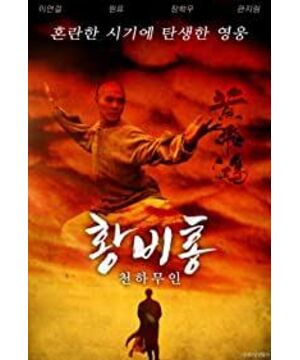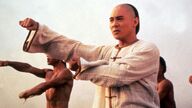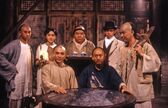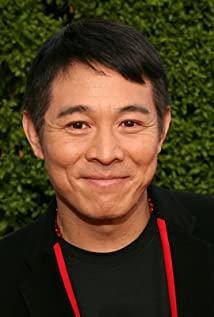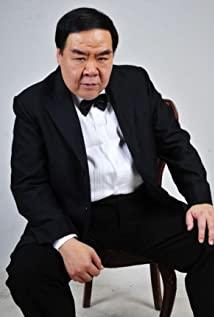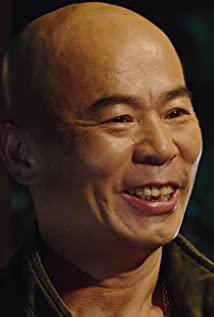——Jinshan, is there a Jinshan in the world? ——If there is a golden mountain in this world, why should those foreign ships come to our port? Perhaps we are already standing on the Golden Mountain. —— Tsui Hark, "Huang Feihong's Rising Aspirations"
By Yang Daxia
One·Lingyun
Just as martial arts novels are a unique genre of Chinese novels, martial arts movies are also a unique genre of movies in China.
In all martial arts films, the three words "Huang Feihong" is a topic that can never be avoided.
In 1991, "Once Upon a Time in the Clouds" directed by Tsui Hark (hereinafter referred to as "Once Upon a Time") was released in Hong Kong, and it was only eighth at the box office, because there were too many excellent films that year: "Playing Back to School" and "Lonely" "Across the World" and so on, it is difficult for "Huang Feihong" to have much room for development.
However, in the second year of the Golden Image Awards ceremony, "Huang Feihong" has overwhelmed all high-grossing movies, winning four awards including best director, best soundtrack, best editing, and best action director in one fell swoop.
Why can a genre movie with an average box office stand out among a lot of mainstream movies with high box office?
Because it takes all aspects of martial arts movies to the extreme, and redefines martial arts movies.
Second, the martial arts dream that has been brewing for ten years
As early as 1991, movies about Huang Feihong had been overwhelming.
Since 1946, Guan Dexing has made 77 movies of Huang Feihong in one go.
In 1976, Liu Jiahui played "Lu Acai and Huang Feihong".
In 1978, under the guidance of Yuan Heping, Jackie Chan played the role of Huang Feihong in "Drunken Fist".
Tsui Hark, who loves martial arts novels, will naturally not let go of these martial arts films.
However, there was no one that made him feel particularly satisfied:
" Early martial arts films are divided into two types, one is the hero type, the other is the weird type. All Huang Feihong did not jump out of these two circles."
And, apart from Jackie Chan's Huang Feihong who added funny elements, the other Huang Feihong is a template: never use force easily, kill the gods and kill the Buddha with one shot, invincible, and the deification element is too serious.
This cookie-cutter story setting has made Hong Kong people lose interest in martial arts films.
On the other hand, Tsui Hark discovered that the new generation of young Hong Kong people has no sense of history.
"They are a generation that is tired of history. They don't want to hear or understand modern history, or what happened in the time of their ancestors or grandfathers."
Therefore, in the early 1980s, Tsui Hark had the idea of filming Huang Feihong.
"I looked at some historical materials of Huang Feihong and found that his era was on the verge of confrontation between Eastern and Western cultures. He should be a frustrated character, not invincible, because he cannot get rid of traditional Chinese concepts. On the other hand, it is shaken by Western thought. I want to regain Hong Kong people’s interest in history through a brand-new historical figure and story."
At that time, he watched "Shaolin Temple" and "Shaolin Boy" and met Jet Li through the screen .
"I have been following him ever since. He fits the image of a young master very well."
However, Li Lian soon became an artist under the Shaw Brothers after his career, and Tsui Hark was affiliated with Jiahe Company, and his desire to cooperate has not been realized.
Looking back at other Kung Fu actors, either they are no longer young, or they are not in good shape, or they are all in Shaw Brothers-such as Jackie Chan, Tsui Hark has never found someone who can replace Jet Li.
Since there is no chance at the moment, let it go.
Tsui Hark devoted his energy to the shooting of other films-"Sword Horse Dan", "The True Colors of Heroes", etc., are all high-level works that he completed as a director or producer while waiting for Jet Li.
At the same time, he did not stop writing the script of "Huang Feihong".
As he wrote and wrote, he found that the bigger the topic was, the more things he attracted, and it could no longer be covered by the conflict between Chinese and Western cultures.
3. Scripts with more than ten plots
First of all, Huang Feihong was in the late Qing Dynasty.
The Qing Dynasty was on the verge of falling, with slanderous and treacherous ministers in charge, but some of them were loyal and arrogant ministers.
Among them, there is a person named Liu Yongfu .
There is a record about Liu Yongfu in the "Manuscript of Qing History":
"Yongfu is bony and thin, but courageous, and believes in his lover, so all his followers are doing their best."
After just a few crosses, Tsui Hark decided to add this person to the script:
"The birth of a folk hero must be led by a famous great hero. Liu Yongfu fits this kind of great hero. He was injured in a leg in a war and came to Bao Zhilin to see a doctor. Since then, he has been with Huang Feihong Forging fate is also in line with history itself."
What Liu Yongfu projected on Huang Feihong was the patriotic thought of China.
At that time, although China was bullied by foreign powers, just as there were good people in China, there were good people among foreigners.
Tsui Hark designated this good foreign man as a missionary: “To embody Western thoughts in a short film, missionaries are undoubtedly the most effective.”
This missionary became the one who influenced Huang Feihong's traditional ideas.
In troubled times, some people contribute to the country, while others take the opportunity to make a fortune.
So Tsui Hark wrote the Shahe Gang again : "They are the representatives of the "Nov Liheng" in the troubled times."
If someone makes trouble, someone has to suppress it.
As a result, Tsui Hark wrote about the officials who suppressed the militia : "They have bad roots, and they are ruthless in their actions. This paved the way for the later confrontation between the officials and the people."
Some people cannot make money in the country, while others make money from foreigners.
Therefore, Tsui Hark wrote a broker who sold Chinese : "At that time, many people who came back from abroad poisoned their compatriots. They said that on the other side of the sea, there was a golden mountain full of gold. The broker's participation made the story of the river and mountain broken even more. It’s true and full."
The prosperity of opera also began in the Ming and Qing Dynasties, when there were pear gardens everywhere.
Tsui Hark conceived a Liyuan team as a symbol of mainstream entertainment culture at the time, and also highlights the sadness of people who were still fascinated by the depressing voice when facing the country's broken mountains and rivers.
In such troubled times, there is another role indispensable, that is, the busker of Luo Tuo Jianghu.
"So I created Yan Zhendong, a master of martial arts . After guns and other lethal weapons broke into China, such people not only could not eat, but also lost their principles and dignity."
Of course, for a mature movie, love is often indispensable.
So the thirteenth aunt was born: "The thirteenth aunt in history was named Mo Guilan, a native of Guangdong. I want to portray her as a returnee from overseas and a distant relative of Huang Feihong to represent modern women. Love advocates, and can better conflict with Huang Feihong in the east."
Writing it down all the way, Tsui Hark has buried no less than ten lines in the script of "Huang Feihong":
There is the righteousness of the family and the country, the conflict between China and the West, the gangs in power, the confederacy of the government and the people, the depression of the Chinese people, the depravity of the people, the brokers who harm the people, the great powers and the Qing court, the justice brought by missionaries, and the failures. The tragedy of the rivers and lakes, the touching love, and the fascinating voice of "a man is self-improvement"...
This continued until 1990.
That year, Jet Li was filming his last film on Shaw Brothers in the United States.
One day, Jiahe boss chatted with Tsui Hark and talked about Jet Li: "Can Jet Li make a bigger breakthrough in the film industry?"
Tsui Hark said: "You should find him back, he is a very good actor."
So Jiahe invited Jet Li back to Hong Kong, and Tsui Hark showed him the script.
Faced with such a script, Jet Li didn't even think about it, so he directly agreed and signed a contract with Jiahe after filming in the United States.
"Huang Feihong", which had been brewing for nearly ten years, was finally launched.
Four martial arts guidance
The actor is determined, the next most important thing is the martial arts coaching.
Tsui Hark set his first target on Liu Jialiang and Liu Jiarong .
The father of the Liu brothers, Liu Zhan, is a disciple of Lin Shirong, who is also Huang Feihong's apprentice. He has studied art with Huang Feihong for more than 20 years.
As Huang Feihong's descendants, the Liu brothers are the best candidates.
The two are brothers, but their personalities are very different.
Liu Jiarong would accept Tsui Hark's opinion, but Liu Jialiang would not.
"He was born in a family of martial arts, advocating real swords, guns and kung fu, and he firmly believes in this concept."
And Tsui Hark?
Although Tsui Hark likes martial arts novels, he prefers Xianxia novels. He has read "The Legend of Shushan Swordsman" by the original poster by Huanzhu many times.
Therefore, when he makes movies, he is absolutely unwilling to follow the tricks in the book, and he is more willing to join his own fantasies. Because of this, people call him "Old Monster Xu".
Tsui Hark said: "I don't want Huang Feihong to be a traditional martial artist. I hope he is a'naughty boy.' The moves do not have to be in accordance with the martial arts skills, but each move must be beautiful and enjoyable. Is a great master."
In this regard, he also conceived a well-known leg technique for Huang Feihong, called "Foshan Wuyingjiao".
After listening to Liu Jialiang, he was very dissatisfied: "When such a movie is released, our Hong Quan's 100,000 disciples will laugh to death!"
Tsui Hark said: "My movie is made for people all over the world."
The film was only started, and the martial arts director parted ways with the director.
Tsui Hark was not discouraged. He found another martial arts instructor, Yuan Xiangren, the beggar at the end of "Kung Fu".
Yuan Xiangren's father is a master of Kungfu in the Northern School, so Yuan Xiangren's kungfu is also remarkable.
However, Yuan Xiangren's design philosophy cannot keep up with Tsui Hark's whimsical ideas.
But Yuan Xiangren was generous, and he couldn't do it, so he introduced his brother, Yuan Heping , and he was responsible for making hands and doing physical work.
Yuan Heping is also a martial arts instructor who likes to be creative and unconstrained, and he hits it off with Tsui Hark.
"His martial arts design has a strong sense of rhythm, and he is very in favor of my concept of using WIA to show superb martial arts."
It was also from the beginning of their cooperation that the martial arts film has been greatly changed: it has become very enjoyable.
In the past, martial arts movies were a match between real swords and real guns. Flash Zhan Tengnao basically did not rely on Wia, so it is difficult to see the scenes of flying over the wall and flying rabbits and flocks. Moreover, without the help of Wia, it is difficult for the action to show great power, and it is also difficult to move smoothly.
When everything was ready, Jet Li appeared.
Wu Desperate Actor
The filming started smoothly, and Jet Li's martial arts coordination was quite in place.
But something happened when it was one-third of the time-Jet Li broke his leg.
In that scene, Jet Li under an umbrella, jumped down from the stairs.
The staff felt that the height did not matter, so they didn't tie Wia to him.
They did not consider that Jet Li had old injuries.
Ten years ago, Jet Li was still a national professional martial arts athlete. Zhang Xinyan fell in love with him and asked him to shoot "Shaolin Temple" .
In a fight scene, Jet Li not only broke his calf, but also his medial ligament, two cruciate ligaments, and meniscus.
Seeing that the situation was wrong, the crew immediately rushed him to the hospital. Only the operation time, it took seven and a half hours.
After the operation, the doctor said to him: "Stop all strenuous exercise, or you will be paralyzed sooner or later; if you still shoot an action movie, the end will be: buy a wheelchair for yourself in your later years! "
For the sake of the box office of the movie, the "Shaolin Temple" team collectively concealed Jet Li's injury.
But the national martial arts team knew about this, Jet Li had to end his career as an athlete.
After "Shaolin Temple", Jet Li made several more movies, but because his skills were not as good as "Shaolin Temple", the response got worse and worse.
From 1986 to 1996, Jet Li continued to fall into a career trough, and even showed a semi-retired state.
Therefore, when Tsui Hark asked him to shoot "Once Upon a Time", he immediately agreed--
That is the last chance to prove yourself.
His leg broke, bandaged and cast, Jet Li insisted to continue shooting.
Before long, his waist was injured again.
"I can't give Jet Li a close-up shot. He can't finish all the kicks, churns, and full-body shots."
In desperation, Tsui Hark started looking for a substitute.
He found Xiong Xinxin-that is, the seven ghost feet in "Lion King's Hegemony".
Xiong Xinxin has a similar experience with Jet Li. He started practicing martial arts at the age of 12 and won many national martial arts championships.
And he was fat and thin, not far from Jet Li.
Therefore, the "Huang Feihong" we saw was actually performed by Xiong Xinxin alone.
Recalling the scene at the time, Jet Li said:
"He was performing martial arts on stage, but I was sitting there pretending to be a grand master."
Then when the camera was close-up, Tsui Hark immediately changed into Jet Li; the latter had a plaster hung on his feet, and his face had to show firmness or teasing.
It is such an old, weak and remnant crew who, in pain, bleeding, falling, and climbing, finally completed the pioneering work of the new martial arts era.
Lu Bolan's magnificent editing and soundtrack
After the film is finished, there are only the last two steps left: editing and soundtrack.
Editing is something that Tsui Hark doesn't have to worry about at all. He has a queen editor-Mai Zishan .
In 1989, Tsui Hark collaborated with Mai Zishan for the first time and asked him to edit "The True Colors of Heroes 3: The Song of the Sunset".
Tsui Hark is quick to do things. During this period, he kept urging Mai Zishan to hurry up; on the other hand, he doubted whether Mai Zishan could edit well in the short term.
After watching the finished editing, Tsui Hark was relieved:
"Unexpectedly, he could edit so smoothly in such a short time."
The same was true in 1991, when Tsui Hark left very little time for Mai Zishan.
After finishing "Huang Feihong", Tsui Hark looked at it and sighed:
"It's so magnificent, it's so explosive and speedy!"
As a result, Mai Zishan has an extra title in the Hong Kong film and television circle: Hong Kong's first editor.
After editing, only the soundtrack is left.
During this period, Dai Lemin has been responsible for the complete set of soundtrack checks.
However, Tsui Hark almost felt:
He needs a theme music. As long as the theme music is played, it can make people feel excited, excited, and proud of being a Chinese man.
He immediately thought of Huang Zhan.
Since the production of "A Chinese Ghost Story" in 1987, Tsui Hark has worked with Huang Zhan, and he knows his talent for martial arts soundtracks too well.
Tsui Hark took Huang Zhan to the crew and discussed with him about the theme music.
At this time, the ancient song "General Order" came from the tape recorder .
It was cold at the time, but all crew members couldn't help but feel refreshed.
Huang Zhan patted his thigh: "That's it!"
After he went back, he used drums, suona, violin and other Chinese and Western instruments to smelt the famous martial arts music-"A Man Should Be Self-improvement" .
After he filled in the lyrics, he thought: "Who can I sing?"
Huang Zhan called his brother to discuss together, and the two decided unanimously: In Hong Kong, no one except Lin Zixiang can sing.
"I told Zixiang, please imagine that there are thousands of troops, including suona, violin, drums, Chinese drums, and all drums from north to south!"
As a result, Lin Zixiang opened his mouth and not only achieved the effect Huang Zhan wanted, he also took the initiative to sing an octave treble at the end!"
After listening to Tsui Hark, he let out a long sigh of relief——
After thinking about "Huang Feihong" for ten years, today finally came to an end.
Seven Jinshan
In the second year, "Huang Feihong" won four golden awards.
Who are these four awards given to?
The best director was awarded to Tsui Hark.
The best martial arts instructor was awarded to Yuan Xiangren.
The best editing was awarded to Mai Zishan.
The best soundtrack was awarded to Dai Lemin and Huang Zhan.
In addition, Best Picture, Best Supporting Actor (Jacky Cheung), Best Photography, and Best Art Director were all nominated for the Academy Awards.
A year ago, at the Golden Horse Awards in Taiwan, Dai Lemin and Huang Zhan also won the best soundtrack.
I think that if Jet Li was not injured and filmed the entire movie from start to finish, it is still open to question who will win the "Best Actor" award.
29 years have passed since this movie.
In the past 29 years, martial arts movies have changed from traditional martial arts, into action movies that fight for power, then into "Qigong" movies that don't require physical contact, and finally become magical movies about fighting in the air.
Martial arts movies continue to innovate and change, but it is almost impossible to surpass this movie 29 years ago.
why?
Because no matter how difficult it is to have a director, you can bury the dream of a martial arts man for ten years.
No matter how difficult it is to have a script, a movie can reflect the sentient beings of an era.
No matter how difficult it is to have a group of staff members who can argue, quarrel, or even part ways for the optimization of a work.
No matter how hard it is to have a group of actors who can possess stunts, they can bleed, break their bones, and desperately, without frowning.
No matter how hard it is to have such a person, it can be called the "XX First Cut" and "The First Music Score".
Because of all these spirits: years of brewing, continuous improvement, big quarrels, bloodshed, desperate, unreliable, brave change, as this generation ages, and gradually dissipated.
This dissipated thing is the soul of a movie and the sincerity of a group of people.
I really like the last scene of the movie.
After the fight, Huang Feihong and an admiral stood on the bow.
They looked into the distance. In the distance, dark clouds all over are slowly dissipating.
The admiral said: "Golden Mountain? Is there a Golden Mountain in this world?"
Huang Feihong said: "If there is a golden mountain in this world, why should those foreign ships come to our port?"
He paused, and then said: "Maybe, we are already standing on the Golden Mountain."
In the movie, the constantly striving Chinese finally found his "Golden Mountain".
The "Golden Mountain" of the martial arts film, however, stopped forever 29 years ago.
Tsui Hark has watched "Once Upon A Time In America" many years ago, which is called "Once Upon A Time In America" in English.
Therefore, he translated "Once Upon A Time In China" into "Once Upon A Time In China" , which he was very satisfied with .
"Once Upon A Time", translated, it was a long time ago.
And martial arts films-
The real martial arts film, that was also a long time ago.
(END)
View more about Once Upon a Time in China reviews


